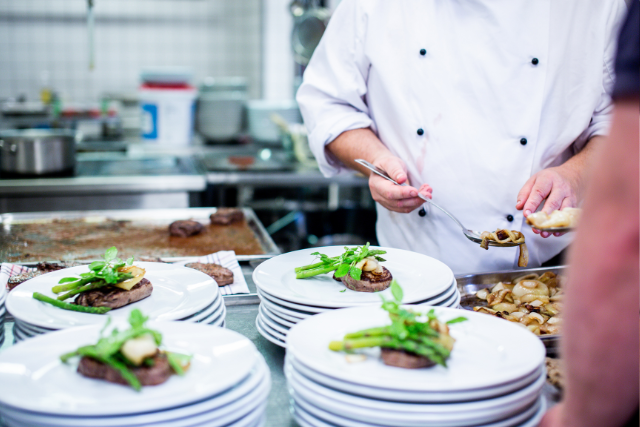
Mindful cooking invites chefs to slow down and stay fully present during food preparation. It means paying attention to each step, selecting ingredients, handling them with care, and preparing meals with intention. More than a method, it’s a mindset that connects the act of cooking to its broader impact on people, daily operations, and the environment.
As the culinary industry places more weight on sustainability, wellness, and transparency, this approach takes on new relevance. Diners are asking where ingredients come from and how dishes are prepared. Kitchens are expected to cut waste, run efficiently, and adapt to evolving standards. In this setting, mindfulness becomes a professional strength that supports sound decisions, thoughtful leadership, and long-term improvement.
In this article, we’ll explore how culinary programs, particularly those at CCA Manila, are implementing this philosophy.
Why Mindfulness Matters in the Modern Kitchen

Professional kitchens are intense environments that demand speed, precision, and seamless teamwork under pressure. Efficiency remains a top priority, but the constant rush and stress can affect quality and well-being.
Mindfulness allows chefs to navigate this demanding atmosphere with clarity and control. When chefs stay fully present, they make better decisions, prioritize tasks more effectively, and communicate calmly with their teams.
Beyond improving workflow, mindfulness supports sustainability efforts. It encourages chefs to treat ingredients with respect, leading to less food waste and more thoughtful sourcing. When chefs understand the value of every component on their station, they are less likely to discard food unnecessarily. This is especially important given the growing focus on ethical sourcing and seasonal cooking.
Mindfulness also plays a key role in mental health. Culinary careers are notorious for burnout and high turnover. Training that emphasizes mindfulness helps chefs manage stress, develop resilience, and maintain balance.
The Bigger Impact of Mindful Cooking Education
Many culinary schools teach mindful cooking, which can be applied to various culinary settings, from restaurants and catering companies to food product development and beyond.
They promote sustainable practices such as sourcing local and seasonal ingredients and reducing food waste. Mindful cooking transcends trends. It offers chefs a skill set that supports long-term success and fosters culinary innovation grounded in responsibility. Alumni from CCA Manila are active contributors to this positive transformation in the industry.
The graduates bring mindfulness into their work every day. Whether creating a menu or managing kitchen staff, their choices reflect awareness of the broader food system and the importance of well-being for people and the planet.
Courses That Reinforce Mindful Cooking

Culinary education opens multiple paths for those who want to develop strong kitchen skills and a thoughtful approach to food preparation. At CCA Manila, two standout programs encourage mindfulness through practice and perspective.
Diploma in Culinary Arts & Technology Management
This comprehensive program blends a practical cooking class with real-world leadership training. Students learn how to prepare food efficiently while thinking critically about sustainability, sourcing, and team dynamics.
Key elements that support mindful cooking:
- Focus on systems thinking: Students explore how their kitchen practices affect supply chains, cost control, and environmental impact.
- Intentional kitchen management: Training includes managing team flow, minimizing waste, and maintaining consistent quality under pressure.
- Menu development with purpose: Lessons encourage using seasonal ingredients, reducing overproduction, and designing menus that are both creative and sustainable.
- Leadership readiness: The program includes modules on food business strategy, innovation, and kitchen culture—all with a mindful lens.
Graduates with this culinary arts degree often move into positions that shape food practices at scale, including:
- Corporate chefs
- Executive chefs
- R&D and product development chefs
These roles demand more than cooking talent—they require vision, planning, and the ability to influence how food is sourced, prepared, and presented. The diploma program supports that by grounding students in habits that align with long-term impact and responsible leadership.
Fundamentals in Culinary Arts
Fundamentals in Culinary Arts is designed for aspiring cooks, food entrepreneurs, and serious hobbyists who want a solid technical foundation and thoughtful guidance. It builds skill gradually, without rushing through the basics.
How the course supports mindfulness:
- Slow, structured progression: Students build confidence through hands-on repetition and instructor feedback, reinforcing presence and focus.
- Respect for ingredients: Lessons emphasize proper handling, storage, and preparation, encouraging care and minimizing waste.
- Attention to detail: From knife skills to temperature control, students are taught to observe closely and adjust with precision.
- Reflection through practice: Students are encouraged to think about what works, what doesn’t, and why—developing awareness and intention with each task.
This course helps learners move beyond just “getting the job done” to developing a deeper understanding of how and why techniques work. The habits formed here, such as calm focus, steady hands, and thoughtful pacing, translate well into professional and personal kitchens.
Training for a More Conscious Culinary Future with CCA Manila
Mindful cooking shapes how food is prepared, presented, and experienced. It calls for chefs to stay fully present, work with intention, and make thoughtful choices that support quality and responsibility.
For aspiring chefs who want to develop these habits from day one, studying at CCA Manila is a smart step forward. Here, students learn the techniques behind great cooking and the values that guide sustainable, thoughtful kitchen practices. The focus on mindfulness helps build careers rooted in clarity, purpose, and long-term impact.
We also offer specialized programs, short courses, and advanced modules for professionals who want to deepen their skills or explore new culinary directions with intention and creativity.
Ready to begin? Enroll now and train for the future-focused culinary career that makes a real difference!
